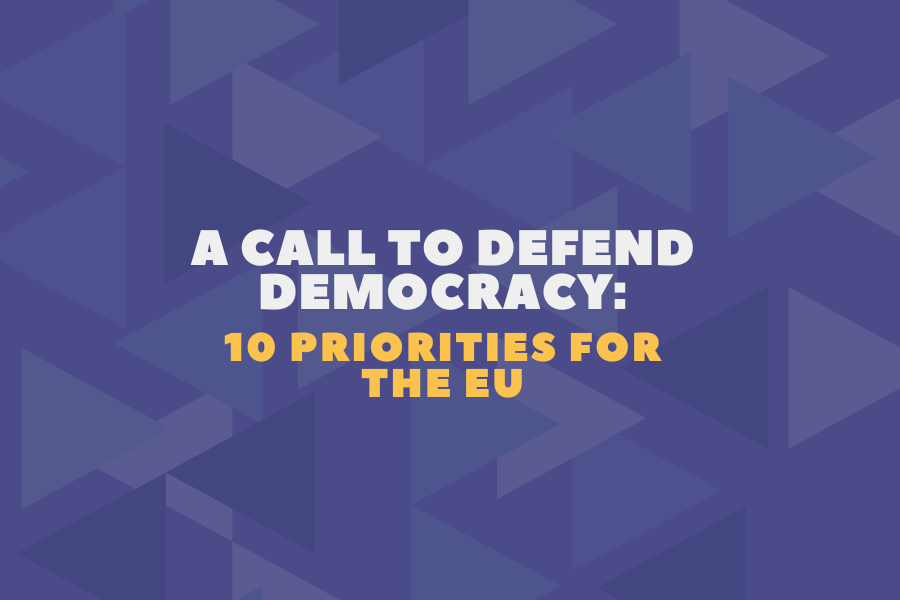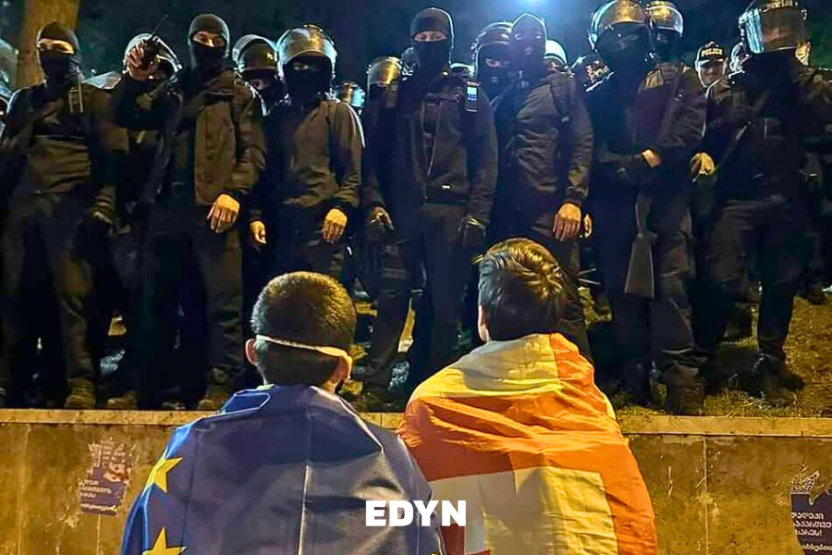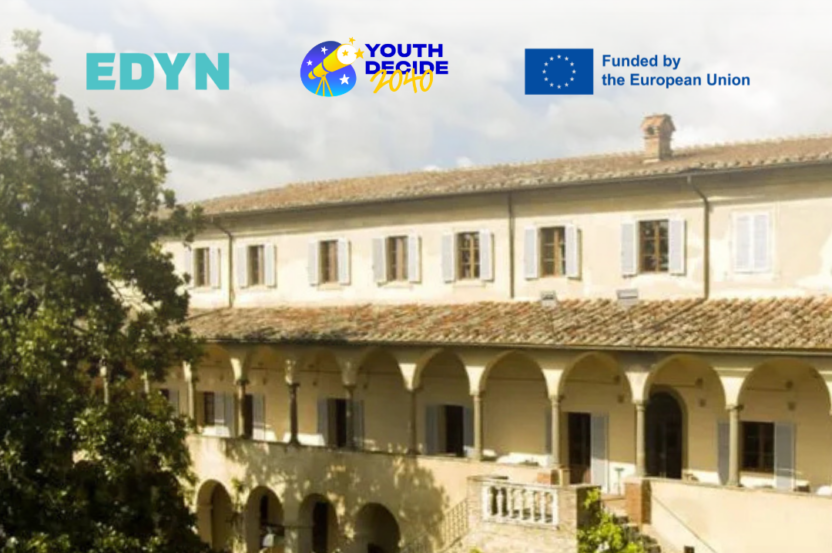EDYN signed a joint statement by the International IDEA Statement to Defend Democracy. By joining forces with other pro-democracy organizations, youth groups, and esteemed political and civic figures worldwide, EDYN strengthens its advocacy for democratic principles. We recognize that the support and engagement of the young generation of leaders to democratic values will be crucial to democracy’s future in Europe and beyond. You can read the whole statement below.
On June 6-9, 2024, European voters representing nearly 450 million European citizens will participate in the European Parliament elections. These elections will reaffirm the European Union’s foundational commitment to democratic values and its vital role as a pole of democratic development in an increasingly authoritarian world.
Today, democracy faces an array of grave challenges, globally as well as within the EU’s own borders. EU institutions, custodians of the most successful multi-national project ever attempted to uphold the values of democracy, peace, sustainable development, and multilateralism, bear a historic responsibility at this critical juncture.
We, leaders from different countries and walks of life, thus call upon the next EU leadership to consider these ten priorities to place democracy, at home and abroad, at the top of the policy agenda in the Union for the duration of their mandates and beyond.
Democracy is under threat
There is abundant evidence that democracy is, by far, the preferred form of government by most people in the world, as the best guarantor for human development and a vibrant and pluralist civic space. Yet, growing socio-economic inequalities, corruption, polarization, disinformation, and the acute uncertainties created by the climate crisis and disruptive digital technologies have eroded satisfaction with democratic institutions in many countries. This process has coincided with large geopolitical shifts in which the influence and boldness of some authoritarian regimes, as well as the coordination among them, have visibly grown.
The global weakening of democracy has gone hand-in-hand with a rise in global conflict, which has intensified migration flows, energy shortages, and trade disruptions, while imposing large defence investments for many years to come. For most countries in the world –certainly for the EU—the global erosion of democracy has become a pressing threat to their security.
These converging challenges have created a real risk that in this global election year, EU member states as well as some of its key partners may see the ascent of anti-democratic political actors. This has already happened in some EU countries, where basic tenets of democratic governance, fundamental rights, and the rule of law have been steadily declining for several years. These pressures undermine not only the EU’s founding democratic values, but also the credibility of its efforts to strengthen democracy around the world.
The EU as a democracy leader
The EU has emerged as a global leader on democratic support. For decades, the EU’s external policies have advanced democracy, human rights, and the rule of law in all continents. Today, the EU and its member states are the biggest provider of democracy support globally. Despite the Union’s internal challenges to the rule of law, citizens around the world still consider the EU an indispensable actor to defend universal democratic values, such as human rights and accountable governance. Moreover, the EU’s role as a global norm-setter on new democracy areas such as data protection, digitalization, and the governance of digital platforms and technologies (e.g. Artificial Intelligence) has further strengthened its ability to support citizens fighting autocratic control. The EU has demonstrated a laudable appetite for trialing democratic innovations to better connect its institutions with European citizens, as well as encouraging the involvement of citizens in policymaking among its member states.
A call to prioritise democracy
Ensuring strong democracies in European Member States is the basis for combating challenges such as the rise of extremism, election interference, the spread of manipulative information and threats to journalists. Safeguarding democracy at home, moreover, also maintains the EU’s legitimacy abroad. We suggest the following priorities to better uphold democracy and the rule of law within the EU:
- Integrating democracy as an ambitious work programme in the EU’s regional funds, agricultural policy, and recovery funds, all of which are served by a more democratic union. 2. Expanding the EU’s toolbox to uphold the rule of law within its borders, using it consistently, transparently and in full protection of the EU’s financial interests, while continuing efforts to reconnect citizens with democracy.
- Preserving and enhancing the European Commission’s efforts to combat disinformation, to promote media freedom and pluralism by supporting journalists and human rights defenders, and to regulate the role of money in politics.
- Putting democracy and human rights considerations at the heart of the regulation and enforcement of new and emerging digital technologies, and providing better data access for monitoring by experts.
- Increasing support to representative democratic institutions, political parties, civil society organizations, independent media, and citizen participation both inside and outside the EU, including through mechanisms to report unlawful restrictions on them, and discouraging its member states from legislation and activities that undermine civic space and fundamental rights.
- Vesting the responsibility to support democracy with an EU Commissioner that has the necessary profile and democracy track-record and is endowed with sufficient resources to effectively pursue this crucial mandate.
Externally, we expect to see the EU uphold its founding values in the face of security, migration, energy and trade pressures. We expect it to place democracy at the heart of these agendas and acknowledge that the Union’s interests are better protected in a more democratic world. We thus call for the adoption of the following priorities by the EU:
- Mainstreaming democracy in its trade and investment agendas, such as its flagship Global Gateway infrastructure programme, in ways that are measurable and help showcase that democracy can deliver for the wellbeing aspirations of citizens.
- Prioritizing the protection of electoral integrity worldwide, including by renewing the EU’s guidelines on electoral support and strengthening EU election observation.
- Placing democracy, the rule of law, and fundamental rights at the top of EU concerns in its current drive for enlargement (‘fundamentals first’), this being the single most effective and proven mechanism to accelerate accession talks, and to contribute to a fact-based debate on enlargement.
- Allocating increasing resources to programmes and staff dealing with democracy and civic space, both in the EU’s immediate neighbourhood and globally, for reasons of principle and because a more democratic world serves the EU’s broader security, trade and migration interests.
With these ten priorities, we call upon the future authorities of the European Parliament, the Council, and the European Commission to seize the opportunity of these European elections to defend and support democracy as the hallmark of the EU’s existence. Only by practicing its foundational values will the EU maintain its credibility as a global champion of democracy.



